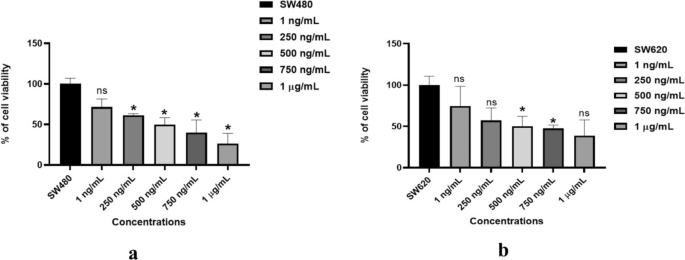BMAP-27 Peptide Reduces Proliferation and Increases Apoptosis in Primary and Metastatic Colon Cancer Cell Lines
IF 2.4
4区 生物学
Q4 BIOCHEMISTRY & MOLECULAR BIOLOGY
International Journal of Peptide Research and Therapeutics
Pub Date : 2023-10-19
DOI:10.1007/s10989-023-10572-9
引用次数: 0
Abstract
Abstract BMAP-27 peptide is reported to possess apoptotic and anti-proliferative effects against cancer cells but the actual mechanism of action is yet to be investigated. In the current investigation, we aimed to study the role of the BMAP-27 peptide in reducing proliferation and increasing apoptosis in colon cancer cell lines. In this study, we used primary and metastatic colon cancer cell lines SW480 and SW620. Cell proliferation was measured using MTT and CCK-8 assays, and cellular damage was analyzed by lactate dehydrogenase assay. Apoptosis, cell cycle, and proliferation potentials were measured by the expression of CASPASE3, BAX, BCL-2, TP53, CDK-6, PCNA, WNT11, AXIN1 , and CTNNB1 genes. Additionally, in-silico studies were conducted to determine the binding affinities of BMAP-27 with adenomatous polyposis coli (APC) and β-catenin proteins, one of the primary regulators of colon cancer. BMAP-27 peptide reduced colon cancer cell proliferation, upregulated tumor suppressor genes CASPASE3, BAX, TP53, AXIN1 expression, and downregulated the expression of oncogenes BCL-2, CDK-6, PCNA, WNT11, CTNNB1 in both the cell lines, however, in the primary colon cancer cell line the changes are found to be more significant. The molecular dynamic simulation analysis revealed substantial binding affinity of the peptide to APC and β-catenin proteins. BMAP-27 peptide significantly inhibited the proliferation and induced apoptosis in the primary colon cancer cell line than in the metastatic colon cancer cell line. In-silico results suggest that BMAP-27 shows a strong binding affinity with APC and β-catenin proteins, highlighting its role in inhibiting colon cancer cell proliferation.

BMAP-27肽可减少原发性和转移性结肠癌细胞系的增殖并增加凋亡
摘要BMAP-27肽具有抑制肿瘤细胞增殖和凋亡的作用,但其作用机制尚不清楚。在本次研究中,我们旨在研究BMAP-27肽在结肠癌细胞系中减少增殖和增加凋亡的作用。在这项研究中,我们使用了原发性和转移性结肠癌细胞系SW480和SW620。MTT和CCK-8法检测细胞增殖,乳酸脱氢酶法检测细胞损伤。通过CASPASE3、BAX、BCL-2、TP53、CDK-6、PCNA、WNT11、AXIN1和CTNNB1基因的表达来检测细胞凋亡、细胞周期和增殖潜能。此外,还进行了计算机研究,以确定BMAP-27与大肠腺瘤性息肉病(APC)和β-catenin蛋白(结肠癌的主要调节因子之一)的结合亲和力。BMAP-27肽可降低结肠癌细胞增殖,上调抑癌基因CASPASE3、BAX、TP53、AXIN1的表达,下调致癌基因BCL-2、CDK-6、PCNA、WNT11、CTNNB1的表达,但在原发性结肠癌细胞系中变化更为显著。分子动力学模拟分析显示,该肽与APC和β-catenin蛋白具有较强的结合亲和力。BMAP-27肽在原发性结肠癌细胞系中比在转移性结肠癌细胞系中显著抑制增殖和诱导凋亡。结果表明,BMAP-27与APC和β-catenin蛋白具有较强的结合亲和力,在抑制结肠癌细胞增殖中具有重要作用。
本文章由计算机程序翻译,如有差异,请以英文原文为准。
求助全文
约1分钟内获得全文
求助全文
来源期刊
CiteScore
5.50
自引率
8.00%
发文量
131
审稿时长
>12 weeks
期刊介绍:
The International Journal for Peptide Research & Therapeutics is an international, peer-reviewed journal focusing on issues, research, and integration of knowledge on the latest developments in peptide therapeutics. The Journal brings together in a single source the most exciting work in peptide research, including isolation, structural characterization, synthesis and biological activity of peptides, and thereby aids in the development of unifying concepts from diverse perspectives. The Journal invites substantial contributions in the following thematic areas:
-New advances in peptide drug delivery systems.
-Application of peptide therapeutics to specific diseases.
-New advances in synthetic methods.
-The development of new procedures for construction of peptide libraries and methodology for screening of such mixtures.
-The use of peptides in the study of enzyme specificity and mechanism, receptor binding and antibody/antigen interactions
-Applications of such techniques as chromatography, electrophoresis, NMR and X-ray crystallography, mass spectrometry.

 求助内容:
求助内容: 应助结果提醒方式:
应助结果提醒方式:


